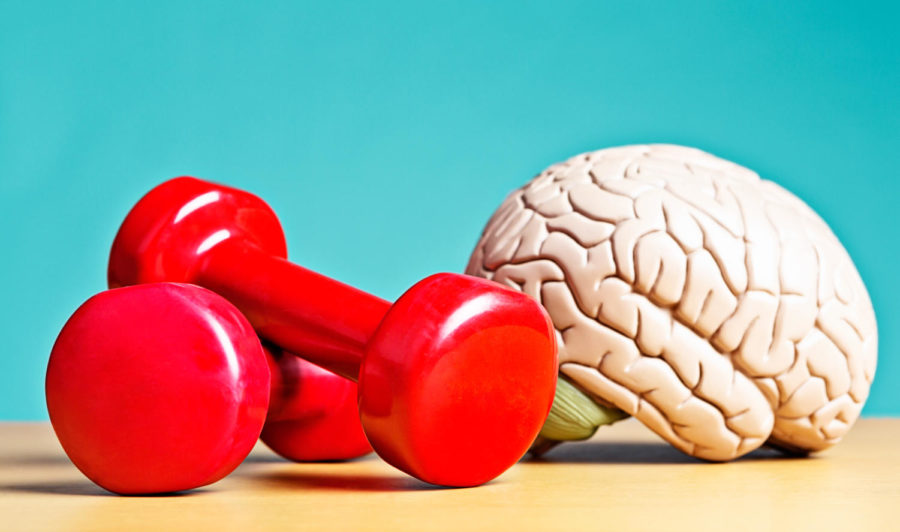Tyrrell: Your brain is a muscle, use it
A model brain sits next to exercise weights. Metaphor for heavyweight intellects, or a reminder that exercise helps your circulation, so as well as keeping your body fit, it also keeps you mentally active. Double bonus!
February 28, 2018
All throughout high school, I was convinced that I wasn’t a math person. I was okay at it, but I was never the best, and I always preferred English or anthropology over calculus.
This was true to such an extent that almost everyone I knew was shocked when I decided to major in engineering. They wanted to know why I would choose a math-heavy major when I hated math so much, and when I had spent most of high school focusing on my language skills.
It wasn’t until I started classes here that I started to change the way I thought about myself and my style of learning. I had assumed that I’d struggle through four years of math and science classes, sticking it out for the payout of an engineering degree when I graduated. It wasn’t until halfway through the semester that I was struck with a realization: I really, really liked calculus.
It wasn’t just calculus either. I found myself really enjoying chemistry and coding, two things that I had previously expressed no interest in and even hated.
At first, I was amazed by this realization.
Like I said, I’d assumed that I would toil through my STEM classes until graduation, only really enjoying the rare English class or elective that I would have to take.
But as I was immersed in more math than I’d ever wanted to study, I realized why exactly I found myself enjoying it: the exact same traits that had always drawn me to the humanities – creativity and critical thinking – were now required in calculus.
Maybe it was the transition from high school to college, or maybe it was just that I’d reached a higher level of study, but no longer was it enough to follow a memorized set of steps to solve each problem. Now I actually had to think creatively about math and problem solve on my own.
And I found myself really liking it.
This realization completely changed my perspective on “math people” vs. “language people.” The idea that you can only be good at one subject or the other is nonsense. I strongly believe that anyone can grow their skills in math, English or any other subject, the same way you can strengthen a physical muscle in your body.
In fact, one recent study found that your brain uses the same processing system to interpret language as it does to learn math. This not only implies that math and literacy are more intertwined than we previously thought, but also that your innate ability to learn one is tied to the other.
In other words, your skill at language arts vs. math has a lot more to do with your environment and how the subject is taught to you than your own genetic disposition.
Of course, not everyone enjoys doing math problems, the same way not everyone enjoys writing an essay. But it’s been my experience that often, hatred for a subject stems from your own belief that you aren’t good at it. You would never go to the gym and skip a muscle group just because you aren’t good at it. You’d work even harder to strengthen that weak spot. Your brain is no different.
I can’t promise that you’ll suddenly find yourself loving calculus or essay writing, but by viewing your skill in a subject as a muscle rather than a set characteristic, I guarantee you’ll become a changed student.
College is hard enough as it is. Don’t make it worse by creating limits for yourself.
















